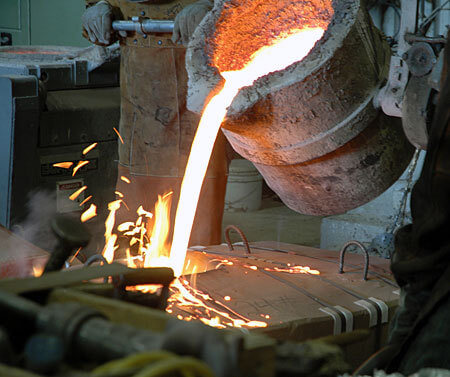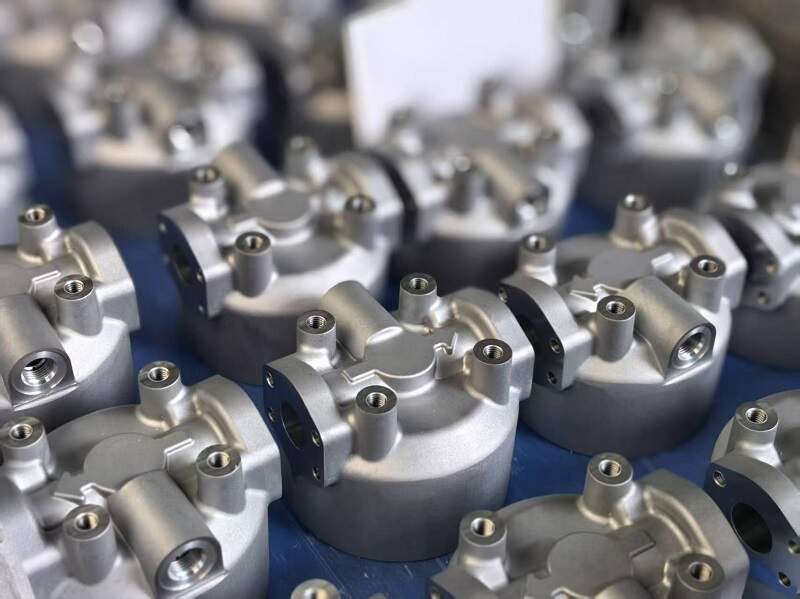Discover the advancements in Precision aluminum casting for modern industries
Wiki Article
The Influence of Cutting-edge Shop Services on Lasting Production Practices
Cutting-edge foundry solutions play a necessary role beforehand sustainable production techniques. By integrating recycling innovations and energy-efficient processes, these services substantially lower ecological impact. Foundries can redeem important materials, consequently decreasing dependancy on virgin resources. As automation and lean production concepts obtain traction, manufacturing performance is maximized. The full degree of these innovations and their ramifications for the future of producing stay to be checked out.The Function of Advanced Recycling Technologies in Foundries
Advanced reusing innovations are transforming the landscape of factories by improving material recuperation and lowering waste. These innovative procedures enable shops to reclaim beneficial steels and materials from scrap, minimizing reliance on virgin sources. By integrating sophisticated sorting, shredding, and melting strategies, foundries can successfully draw out functional materials from disposed of products, thus advertising a round economic climate.These technologies support the production of top quality alloys and parts, making certain that recycled products fulfill rigorous market standards. Consequently, foundries are not just improving their material performance yet likewise decreasing the environmental influence connected with traditional production techniques
This change towards advanced reusing not just bolsters financial feasibility for factories but likewise lines up with worldwide sustainability goals. Eventually, the incorporation of these innovations stands for a considerable progression in the mission for sustainable manufacturing methods within the factory field.
Power Efficiency: Decreasing Intake in Production Processes
Power efficiency in manufacturing procedures is vital for lasting procedures. Approaches such as process optimization strategies, eco-friendly power combination, and waste heat healing play important duties in minimizing power intake. By concentrating on these areas, producers can substantially decrease their ecological influence while enhancing productivity.Process Optimization Techniques
A significant number of producing centers are significantly adopting process optimization techniques to improve power effectiveness and lower intake. These techniques entail assessing and fine-tuning manufacturing workflows, determining traffic jams, and applying automation to enhance procedures. By leveraging data analytics, producers can monitor power usage in real-time, making it possible for positive adjustments to lessen waste. Methods such as Lean Manufacturing and 6 Sigma focus on getting rid of inadequacies and enhancing source allowance. In addition, progressed technologies like Internet of Points (IoT) sensing units provide understandings right into equipment efficiency, promoting anticipating upkeep that prevents energy loss. Generally, these process optimization approaches not just add to lowered energy intake yet likewise promote a culture of continuous renovation within manufacturing environments, lining up functional exercise with sustainability objectives.Renewable Resource Combination
Many production facilities are increasingly incorporating renewable power sources to improve total energy performance and minimize dependence on typical power grids. This adjustment includes the adoption of solar, wind, and biomass energy, which can significantly reduce operational expenses and reduce carbon impacts. By utilizing these sustainable energy sources, suppliers not only lessen their ecological impact but likewise boost energy strength. Furthermore, incorporating sustainable power systems commonly involves advanced modern technologies such as power storage space and clever grid solutions, which optimize power usage and help with real-time surveillance. This assimilation supports manufacturers in achieving regulatory conformity and conference sustainability objectives while fostering advancement in production procedures. Eventually, sustainable power combination represents an essential shift in the direction of even more sustainable manufacturing practices and long-lasting stability.Waste Warmth Recovery
Integrating eco-friendly energy sources sets the phase for additional developments in energy effectiveness, especially with the execution of waste heat healing systems. These systems catch excess thermal power generated during manufacturing procedures, which would certainly otherwise be shed to the setting. By repurposing this heat, shops can significantly reduce their power consumption, reduced operational costs, and minimize their carbon footprint. The recouped heat can be utilized for numerous applications, such as home heating, power generation, or preheating raw products. Because of this, waste warmth recuperation not only enhances energy performance yet likewise adds to a sustainable production version. Ingenious factory services that prioritize this innovation are leading the method for an ecologically accountable industrial landscape, lining up earnings with environmental stewardship.Using Eco-Friendly Products in Foundry Workflow
As the need for sustainable manufacturing methods expands, foundries are significantly turning to green materials to enhance their operations. By including lasting alternatives, such as bio-based binders and recycled steels, shops can substantially decrease their environmental footprint. These products typically require much less energy for processing and can minimize damaging exhausts during production.Moreover, the fostering of eco-friendly products not only aligns with governing requirements but also satisfies consumer preferences for greener items. Factories are checking out ingenious options, such as using organic additives that improve mold high quality while continuing to be safe.
The change to lasting materials fosters a circular economy by advertising source reuse and reducing waste. Furthermore, this modification can enhance the total efficiency of shop operations, as environment-friendly products usually display superior buildings, bring about enhanced item performance - Aluminum Casting Company. important site Eventually, the use of environment-friendly products represents an essential action toward sustainable manufacturing in the shop industry

Developments in Waste Administration and Decrease Techniques
The shift in the direction of environment-friendly materials in factory operations leads the way for improvements in waste management and reduction strategies. Innovative foundry solutions are significantly taking on techniques that lessen waste generation and advertise recycling. Methods such as closed-loop systems allow for the reuse of materials, significantly lowering the volume of waste produced during making processes. Furthermore, innovations in purification and splitting up modern technologies make it possible for the effective healing of useful by-products, which can be reintegrated into the manufacturing cycle.Furthermore, the application of real-time tracking systems gives data-driven insights into waste generation patterns, helping with educated decision-making to enhance source usage. Factories are additionally exploring biowaste options, transforming natural waste right into energy or usable materials, even more promoting sustainability. These advancements not only add to a circular economic situation but also improve the overall environmental performance of factory procedures, underscoring the market's commitment to reducing its ecological impact.
The Effect of Automation on Sustainable Production
While several markets go for sustainability, automation arises as a vital consider boosting sustainable production techniques within factories. By integrating automated systems, shops can achieve better effectiveness, minimize waste, and lower power usage. Automated procedures enable precise control over manufacturing criteria, minimizing issues and rework, which subsequently saves sources.Moreover, automation facilitates the monitoring of environmental effects, allowing real-time modifications that line up with sustainability goals. aluminum casting. Advanced robotics and man-made knowledge can optimize product use, bring about considerable decreases in scrap and discharges
Additionally, automated innovations promote much safer workplace by dealing with harmful jobs, thus boosting worker wellness while making certain compliance with ecological regulations. In general, the fostering of automation within foundries not just improves operations yet likewise plays a crucial role in progressing sustainable manufacturing practices, contributing to an extra accountable commercial landscape.
Situation Studies: Effective Implementation of Lasting Shop Practices
Successful execution of sustainable techniques in factories can be illustrated with various case research studies that highlight quantifiable outcomes and cutting-edge methods. One remarkable example is a mid-sized factory that adopted a closed-loop water recycling system, minimizing water consumption by 40% and reducing wastewater generation. Furthermore, this center transformed to making use of environment-friendly mold products, which not only enhanced item quality but additionally improved worker security.An additional significant situation included a big shop incorporating eco-friendly power sources, such as photovoltaic panels, which balance out 30% of its power needs. This campaign not only decreased operational prices but also added to a considerable decrease in carbon emissions.
A shop that executed lean manufacturing techniques reported a 25% increase in performance, leading to less material waste and maximized production procedures. These situations collectively underscore the tangible benefits and sustainability advancements attainable via ingenious shop practices.
Regularly Asked Inquiries
Exactly How Do Cutting-edge Foundry Services Contribute to Overall Sustainability Goals?
Cutting-edge shop services boost general sustainability goals by maximizing source use, decreasing waste, and boosting energy effectiveness. These developments add to reduce carbon footprints and promote environmentally accountable practices within the production sector, supporting more comprehensive check here sustainability efforts.What Are the Economic Benefits of Adopting Lasting Factory Practices?
Embracing lasting foundry practices can decrease functional expenses, improve resource effectiveness, and improve competition. Furthermore, these techniques can bring in eco-conscious customers and capitalists, eventually causing increased profitability and long-lasting financial stability for organizations.Just How Can Little Factories Implement Lasting Technologies Effectively?
Little factories can apply sustainable advancements successfully by embracing energy-efficient technologies, maximizing source use, training staff on lasting techniques, collaborating with providers for environmentally friendly products, and involving in constant enhancement procedures to reduce waste and exhausts.What Qualifications Exist for Lasting Foundry Workflow?

Exactly How Do Customer Preferences Impact Sustainable Manufacturing in Foundries?
Consumer choices considerably affect lasting production in shops by driving demand for green items. As consumers focus on sustainability, shops adjust Continue their practices, incorporating greener products and modern technologies to satisfy market expectations and enhance their competitive benefit.By repurposing this warm, factories can considerably decrease their energy intake, reduced functional costs, and decrease their carbon impact. Foundries are additionally discovering biowaste solutions, transforming organic waste into energy or usable materials, additionally advertising sustainability. By incorporating automated systems, shops can achieve higher efficiency, reduce waste, and reduced power usage. An additional significant situation entailed a huge shop integrating renewable power resources, such as solar panels, which balance out 30% of its energy needs. Innovative shop solutions boost general sustainability goals by maximizing source usage, lowering waste, and boosting energy effectiveness.
Report this wiki page